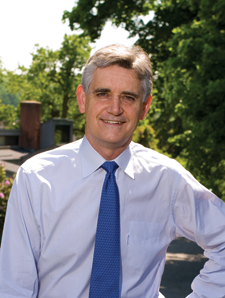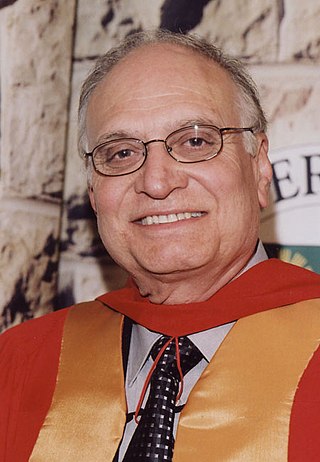
The Journal of Biological Chemistry (JBC) is a weekly peer-reviewed scientific journal that was established in 1905. Since 1925, it is published by the American Society for Biochemistry and Molecular Biology. It covers research in areas of biochemistry and molecular biology. The editor is Alex Toker. As of January 2021, the journal is fully open access. In press articles are available free on its website immediately after acceptance.

Roger David Kornberg is an American biochemist and professor of structural biology at Stanford University School of Medicine. Kornberg was awarded the Nobel Prize in Chemistry in 2006 for his studies of the process by which genetic information from DNA is copied to RNA, "the molecular basis of eukaryotic transcription."

John Kuriyan is the dean of basic sciences and a professor of biochemistry at Vanderbilt University School of Medicine. He was formerly the Chancellor's Professor at the University of California, Berkeley in the departments of molecular and cell biology (MCB) and chemistry, a faculty scientist in Berkeley Lab's physical biosciences division, and a Howard Hughes Medical Institute investigator. He is a member of the National Academy of Sciences and he has also been on the Life Sciences jury for the Infosys Prize in 2009, 2019 and 2020.
William E.M. Lands is an American nutritional biochemist who is among the world's foremost authorities on essential fatty acids.

The American Society for Biochemistry and Molecular Biology (ASBMB) is a learned society that was founded on December 26, 1906, at a meeting organized by John Jacob Abel. The roots of the society were in the American Physiological Society, which had been formed some 20 years earlier. ASBMB is the US member of the International Union of Biochemistry and Molecular Biology.

Bruce William Stillman, AO, FAA, FRS is a biochemist and cancer researcher who has served as the Director of Cold Spring Harbor Laboratory (CSHL) since 1994 and President since 2003. He also served as the Director of its NCI-designated Cancer Center for 25 years from 1992 to 2016. During his leadership, CSHL has been ranked as the No. 1 institution in molecular biology and genetics research by Thomson Reuters. Stillman's research focuses on how chromosomes are duplicated in human cells and in yeast Saccharomyces cerevisiae; the mechanisms that ensure accurate inheritance of genetic material from one generation to the next; and how missteps in this process lead to cancer. For his accomplishments, Stillman has received numerous awards, including the Alfred P. Sloan, Jr. Prize in 2004 and the 2010 Louisa Gross Horwitz Prize, both of which he shared with Thomas J. Kelly of Memorial Sloan-Kettering Cancer Center, as well as the 2019 Canada Gairdner International Award for biomedical research, which he shared with John Diffley.
Tobias C. Walther is the chair of the cell biology program at Sloan Kettering Institute in New York City and a professor at Weill Cornell School of Medicine, where he co-directs the Farese and Walther lab. He has been a Howard Hughes Medical Institute investigator since 2015. His primary responsibilities are to provide leadership in research and teaching in the scientific fields of metabolism, membrane biology and lipids.

Judith P. Klinman is an American chemist, biochemist, and molecular biologist known for her work on enzyme catalysis. She became the first female professor in the physical sciences at the University of California, Berkeley in 1978, where she is now Professor of the Graduate School and Chancellor's Professor. In 2012, she was awarded the National Medal of Science by President Barack Obama. She is a member of the National Academy of Sciences, American Academy of Arts and Sciences, American Association for the Advancement of Science, and the American Philosophical Society.

Eugene Patrick Kennedy (1919–2011) was an American biochemist known for his work on lipid metabolism and membrane function. He attended DePaul University and then became a PhD student at the University of Chicago. From 1959 to 1993 he worked at Harvard Medical School.
Sarah Spiegel is professor and chair of the Department of Biochemistry and Molecular Biology at Virginia Commonwealth University (VCU). In the mid-1990s she discovered the sphingosine-1-phosphate (S1P) molecule, a lipid which has been identified as a signaler for the spread of cancer, inflammation, and cardiovascular disease. Her research continues to focus on S1P.

Mark Andrew Lemmon an English-born biochemist, is the Alfred Gilman Professor and Department Chair of Pharmacology at Yale University where he also directs the Cancer Biology Institute.

Rajendra Kumar Sharma is a professor at the Department of Pathology and Laboratory Medicine, University of Saskatchewan College of Medicine. He holds an earned Doctor of Science from the University of Saskatchewan, and was elected a Fellow of the Royal Society of the Arts (FRSA) in 2014. His contributions to research have been documented in the Encyclopedia of Saskatchewan – A Living Legacy. Sharma has made several discoveries in the areas of colorectal cancer and the cardiovascular system.
Lila Mary Gierasch is an American biochemist and biophysicist. At present, she is a distinguished Professor working on "protein folding in the cell" in the Department of Biochemistry and Molecular Biology at the College of Natural Sciences, University of Massachusetts—Amherst.
Ruma Banerjee is a professor of enzymology and biological chemistry at the University of Michigan Medical School. She is an experimentalist whose research has focused on unusual cofactors in enzymology.
Sarah L. Keller is an American biophysicist, studying problems at the intersection between biology and chemistry. She investigates self-assembling soft matter systems. Her current main research focus is understanding how simple lipid mixtures within bilayer membranes give rise to membrane's complex phase behavior.
Mary L. Kraft is a professor at the department of chemical and biological engineering at the University of Illinois.
Karen Renee Gibson Fleming is a Professor of Biophysics at Johns Hopkins University. She investigates the energetics of transmembrane helix-helix interactions. Fleming was awarded the 2020 Protein Society Carl Brändén Award.

Alexandra C. Newton is a Canadian and American biochemist. She is a Distinguished Professor of pharmacology at the University of California, San Diego. Newton runs a multidisciplinary Protein kinase C and Cell signaling biochemistry and cell biology research group in the School of Medicine, investigating molecular mechanisms of signal transduction in the Phospholipase C (PLC) and Phosphoinositide 3-kinase signaling pathways. She has been continuously funded by the US National Institutes of Health since 1988.
Yusuf Awni Hannun is an American molecular biologist, biochemist, and clinician. He is known for the discovery that sphingolipids have signaling functions.
Robert V. Farese, Jr., is an American physician-scientist and professor of Cell Biology at the Sloan Kettering Institute of Memorial Sloan Kettering. He is an internationally recognized leader in the study of cellular lipid metabolism and has made seminal contributions to our understanding of energy storage as triglycerides in cellular organelles called lipid droplets.









